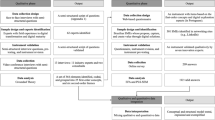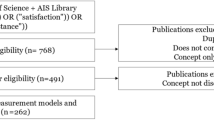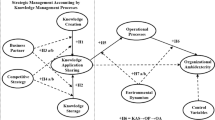Abstract
On the basis of the Chinese schema, we propose that internal social capital manifests itself in the form of ‘guanxi’, trust, and norms. We discuss the concept of interpersonal relationships within the context of Chinese culture by embedding the guanxi concept into a model to investigate the relationships among the three dimensions. We used a survey-based methodology to collect data from 230 employees of the top 100 high-technology firms in Taiwan and structural equation modelling (SEM) with LISREL 8.54 to examine the hypotheses model. The results indicated that at the individual level, guanxi is positively related to both trust and norms, which are also positively related to knowledge sharing. The mediating effects of trust and norms were also found to be significant. Trust directly influences knowledge sharing, and plays a mediating role between knowledge sharing and guanxi. This suggests that knowledge sharing is likely to occur when trust exists among employees. The results further indicate that norms mediate the relationship between guanxi and knowledge sharing. Guanxi among members influences knowledge sharing; therefore, organizations require a feasible solution using the relational norms mechanism. Previous studies have either emphasized the direct influence of social capital or regarded all variables to be of similar importance for knowledge sharing; however, no clear explanations have been provided explaining its influence on knowledge sharing. We advance understanding of why social capital enhances knowledge sharing among employees and the means by which this occurs.

Similar content being viewed by others
References
Adler PS (2001) Market, hierarchy, and trust: the knowledge economy and the future of capitalism. Organization Science 12 (2), 215–234.
Adler PS and Kwon SW (2002) Social capital: prospects for a new concept. Academy of Management Review 27 (1), 17–40.
Bartol KM and Srivastava A (2002) Encouraging knowledge sharing: the role of organizational reward systems. Journal of Leadership and Organization Studies 9 (1), 64–76.
Bartol KM, Quigley NR, Tesluk PE and Locke EA (2007) A multilevel investigation of the motivational mechanisms underlying knowledge sharing and performance. Organization Science 18 (1), 71–88.
Bercovitz J and Feldmann M (2006) Entrepreneurial universities and technology transfer: a conceptual framework for understanding knowledge-based economic development. Journal of Technology Transfer 31 (1), 175–188.
Bettencourt LA, Gwinner KP and Meuter ML (2001) A comparison of attitude, personality, and knowledge predictors of service-oriented organizational citizenship behaviors. Journal of Applied Psychology 86 (1), 29–41.
Blau P (1964) Exchange and Power in Social Life. Wiley, New York.
Bock GW and Kim YG (2002) Breaking the myths of rewards: an exploratory study of attitudes about knowledge sharing. Information Resources Management Journal 15 (2), 14–21.
Bourdieu P (1986) The forms of capital. In Handbook of Theory and Research for the Sociology of Education (Richardson JG, Eds), Greenwood Press, New York.
Brislin RW (1980) Translation and content analysis of oral and written material. In Handbook of Cross-Cultural Psychology-Methodology (Triandis HC and Berry JW, Eds), Vol. 2, pp 349–444, Allyn & Bacon, Boston.
Cabrera EF and Cabrera A (2005) Fostering knowledge sharing through people management practices. International Journal of Human Resource Management 16 (2), 720–735.
Carter C and Scarbrough H (2001) Towards a second generation of KM? The people management challenge. Education and Training 43 (4/5), 215–224.
Cheng BS (1995) Differentiation layout and Chinese organizational behaviors. Indigenous Psychological Research in Chinese Societies 3, 142–220.
Cheng BS (1999) The barriers and outlets in Chinese relationship research. Indigenous Psychological Research in Chinese Societies 12, 203–214.
Chiu CM, Hsu MH and Wang ETG (2006) Understanding knowledge sharing in virtual communities: an integration of social capital and social cognitive theories. Decision Support Systems 42 (3), 1872–1888.
Chisholm AM and Nielsen K (2009) Social capital and the resource-based view of the firm. International Studies of Management & Organization 39 (2), 7–32.
Chowdhury S (2005) The role of affect- and cognition-based trust in complex knowledge sharing. Journal of Managerial Issues 17 (3), 310–326.
Coleman JS (1988) Social capital in the creation of human capital. American Journal of Sociology 94 (Supplement), 95–120.
Coleman JS (1990) Foundations of Social Theory. p 993, Belknap Press of Harvard University Press, Cambridge, MA.
Collins JD and Hitt MA (2006) Leveraging tacit knowledge in alliances: the importance of using relational capabilities to build and leverage relational capital. Journal of Engineering and Technology Management 23 (3), 147–167.
Constant D, Sproull L and Kiesler S (1996) The kindness of strangers: the usefulness of electronic weak ties for technical Advice. Organization Science 7 (2), 119–135.
Costigan RD, Ilter SS and Berman JJ (1998) A multi-dimensional study of trust in organizations. Journal of Managerial Issues 10 (3), 303–317.
Currie G and Suhomlinova O (2006) The impact of institutional forces upon knowledge sharing in the UK NHS: the triumph of professional power and the inconsistency of policy. Public Administration 84 (1), 1–30.
Davenport TH and Prusak L (1998) Working Knowledge. Harvard Business School Press, Boston, MA.
Dixon ND (2000) Common Knowledge: How Companies Thrive By Sharing What They Know. Harvard Business School, Boston, MA.
Drucker PF (1998) Peter Drucker on the Profession of Management. Harvard Business School Press, Boston, MA.
Eastis MC (1998) Organizational diversity and the production of social capital: One of these groups is not like the other. American Behavioral 42 (1), 66–77.
Fan Y (2002) Guanxi’s consequences: personal gains at social cost. Journal of Business Ethics 38 (4), 371–380.
Farh JL and Tsui AS (1997) Where guanxi matters: relational demography and guanxi and technology. Work and Occupations 24 (1), 56–79.
Farh J, Tsui AS, Xin K and Cheng B (1998) The influence of relational demography and guanxi: the Chinese case. Organization Science 9 (4), 471–488.
Foss NJ (2007) The emerging knowledge governance approach: challenges and characteristics. Organization 14 (1), 27–50.
Fukuyama F (1995) Trust: The Social Virtues and the Creation of Prosperity. Hamish Hamilton, London.
Granovetter MS (1992) Problems of explanation in economic sociology. In Networks and Organizations: Structure, Form and Action (Nohria N and Eccles R, Eds), pp 25–56, Harvard Business School Press, Boston.
Grant RM (1996) Toward a knowledge-based theory of the form. (Special issue) Strategic Management Journal 17 (Winter Special Issue), 109–122.
George J and Jones G (1998) The experience and evolution of trust: implications for cooperation and teamwork. Academy of Management Review 23 (3), 531–546.
Hair F, Anderson RE, Tatham RL and Black WC (1998) Multivariate data analysis, 5th edn, Palgrave Macmillan, New York.
Hendricks P (1999) Why share knowledge? The influence of ICT on motivation for knowledge sharing. Knowledge and Process Management 6 (2), 91–100.
Hooff BD and Weenen FL (2004) Committed to share: commitment and CMC use as antecedents of knowledge sharing. Knowledge and Process Management 11 (1), 13–24.
Hoskisson RE, Eden L, Lau CM and Wright M (2000) Strategy in emerging economies. Academy of Management Journal 43 (3), 249–67.
Husted K and Michailova S (2002) Diagnosing and fighting knowledge-sharing hostility. Organizational Dynamics 31 (1), 60–73.
Hutchings K and Michailova S (2004) Facilitating knowledge sharing in Russian and Chinese subsidiaries: the role of personal networks and group membership. Journal of Knowledge Management 8 (2), 84–94.
Hwang KK (1987) Face and favor: the Chinese power game. American Journal of Sociology 92 (4), 944–974.
Inkpen AC and Tsang EWK (2005) Social capital, networks, and knowledge transfer. Academy of Management Review 16 (1), 146–165.
Ipe M (2003) Knowledge sharing in organizations: a conceptual framework. Human Resource Development Review 2 (4), 337–359.
Jacobs JB (1979) The concept of guanxi and local politics in a rural Chinese cultural setting. In Social Interaction in Chinese Society (Greenblatt SL, Wilson RW and Wilson AA, Eds), pp 209–236, Praeger, New York.
Janz B, Colquitt J and Noe RA (1997) Knowledge worker team effectiveness: the role of autonomy, interdependence, team development, and contextual support variables. Personal Psychology 50 (4), 877–904.
Kauppila O-P, Rajala R and Jyrämä A (2011) Knowledge sharing through virtual teams across borders and boundaries. Management Learning 42 (4), 395–418.
Kianto A and Waajakoski J (2010) Linking social capital to organizational growth. Knowledge Management Research & Practice 8 (1), 4–14.
Kim WC and Mauborgne RA (1998) Procedural justice, strategic decision-making, and the knowledge economy. Strategic Management Journal 19 (4), 323–338.
Kogut B and Zander U (1992) Knowledge of the firm, combinative capabilities, and the replication of technology. Organization Science 3 (3), 383–397.
Kogut B and Zander U (1993) Knowledge of the firm and the evolutionary theory of the multinational corporation. Journal of International Business Studies 24 (4), 625–645.
Koh J and Kim Y (2004) Knowledge sharing in virtual communities: an e-business perspective. Expert Systems with Applications 26 (2), 155–166.
Kolekofski KE and Heminger AR (2003) Beliefs and attitudes affecting intentions to share information in an organizational setting. Information & Management 40 (6), 521–532.
Kramer PM (1999) Trust and distrust in organizations: emerging perspectives, enduring questions. Annual Review of Psychology 50 (1), 569–598.
Lam A (1997) Embedded firms, embedded knowledge: problems of collaboration and knowledge transfer in global cooperative ventures. Organization Studies 18 (6), 73–996.
Leana CR and van Buren HJ (1999) Organizational social capital and employment practices. Academy of Management Review 24 (3), 538–555.
Levin DZ and Cross R (2004) The strength of weak ties you can trust: the mediation role of trust in effective knowledge transfer. Management Science 50 (11), 1477–1490.
Liaw GF and Wu CP (2007) The research of the relationships among employees job satisfaction, knowledge sharing and organizational innovation capability. Journal of Technology Management 12 (4), 1–34.
Liden RC and Maslyn JM (1998) Multidimensionality of leader-member exchange: an empirical assessment through scale development. Journal of Management 24 (1), 43–72.
Lin CC and Shiaw SY (2005) Relationship among social support, trust, organizational relationship and knowledge sharing behaviors based on the perspective of social exchange theory. Commerce & Management Quarterly 6 (3), 373–400.
Lin HF (2011) The effects of employee motivation, social interaction, and knowledge management strategy on KM implementation level. Knowledge Management Research & Practice 9 (3), 263–275.
Lin N (1999) Building a network theory of social capital. Connections 22 (1), 28–51.
MacKinnon DP, Fairchild AJ and Fritz MS (2007) Mediation analysis. Annual Review of Psychology 58 (1), 593–614.
MacKinnon DP and Luecken LJ (2008) How and for whom? Mediation and moderation in health psychology. Health Psychology 27 (2), 99–100.
Macneil IR (1980) The New Social Contract: An Inquiry Into Modern Contractual Relations. Yale University Press, New Haven, CT.
Mäkelä K and Brewster C (2009) Interunit interaction contexts, interpersonal social capital, and the differing levels of knowledge sharing. Human Resource Management 48 (4), 591–613.
Markus HR and Kitayama S (1991) Culture and the self: implications for cognition, emotion, and motivation. Psychological Review 98 (2), 224–253.
Matzler K, Renzl B, Müller J, Herting S and Mooradian T (2008) Personality traits and knowledge sharing. Journal of Economic Psychology 29 (1), 301–313.
McAllister DJ (1995) Affect- and cognition-based trust as foundations for interpersonal cooperation in organizations. Academy of Management Journal 38 (1), 24–59.
McCracken G (1988) The Long Interview. Sage Publications, London.
McEvily B and Reagans R (2003) Knowledge structure and knowledge transfer: the effects of cohesion and range. Administrative Science Quarterly 48 (2), 240–267.
Mintzberg H (1973) The Nature of Managerial Work. Harper & Row, New York.
Miles MB and Huberman AM (1984) Qualitative Data Analysis: A SourceBook of New Methods. Sage Publications, Beverly Hills, CA.
Moorhead G and Griffin RW (2001) Organizational Behavior. Houghton Mifflin, New York.
Nahapiet J and Ghoshal S (1998) Social capital, intellectual capital, and the organizational advantage. Academy of Management Review 23 (2), 242–266.
North D (1990) Institutions, Institutional Change and Economic Performance. Norton, New York.
Park SH and Luo Y (2001) Guanxi and organizational dynamics: organizational networking in Chinese firms. Strategic Management Journal 22 (5), 455–477.
Pfeffer J (1972) Size, composition, and function of hospital boards of directors: a study of organization-environment linkage. Administration Science Quarterly 18 (3), 349–364.
Podsakoff PM and Organ DW (1986) Self-reports in organizational research: problems and prospects. Journal of Management 12 (4), 531–544.
Podsakoff PM, MacKenzie SB, Moorman RH and Fetter R (1990) Transformational leader behaviors and their effects on followers’ trust in leader, satisfaction, and organizational citizenship behaviors. Leadership Quarterly 1 (2), 107–142.
Podsakoff PM, MacKenzie SB, Lee JY and Podsakoff NP (2003) Common method biases in behavioral research: a critical review of the literature and recommended remedies. Journal of Applied Psychology 88 (5), 879–903.
Portes A (1998) Social capital: its origins and application in modern sociology. Annual Review of Sociology 24 (1), 1–25.
Putnam RD (1995) Bowling alone: American’s declining social capital. Journal of Democracy 6 (1), 66–78.
Putnam RD (2000) Bowling Alone: The Collapse and Revival of American Community. Simon and Schuster, New York.
Radaelli G, Mura M, Spiller N and Lettieri E (2011) Intellectual capital and knowledge sharing: the mediating role of organizational knowledge-sharing climate. Knowledge Management Research & Practice 9 (4), 342–352.
Rice RE and Aydin C (1991) Attitudes toward new organizational technology: network proximity as a mechanism for social information processing. Administrative Science Quarterly 9 (4), 219–244.
Roussel CS and Deltour F (2012) Beyond cross-functional teams: knowledge integration during organizational projects and the role of social capital. Knowledge Management Research & Practice 10 (2), 128–140.
Scandura TA and Graen G (1984) Moderating effects of initial leader–member exchange status on the effects of a leadership intervention. Journal of Applied Psychology 69 (3), 428–436.
Scarso E and Bolisani E (2012) Trust in knowledge exchanges between service providers and clients: a multiple case study of KIBS. Knowledge Management Research & Practice 10 (1), 16–26.
Sechi G, Borri D, Lucia CD and Celmins V (2011) Social capital as knowledge facilitator: evidence from Latvia. Knowledge Management Research & Practice 9 (3), 245–255.
Selznick P (1957) Leadership in Administration. Harper & Row, New York.
Senge P (1997) Sharing knowledge. Executive Excellence 14 (11), 17–18.
Settoon RP, Bennett N and Liden RC (1996) Social exchange in organizations: perceived organizational support, leader-member exchange, and employee reciprocity. Journal of Applied Psychology 81 (3), 219–227.
Spender JC (1996) Making knowledge the basis of a dynamic theory of the firm. Strategic Management Journal 17 (Winter Special Issue), 45–62.
Stauffer D (1999) Why people hoard knowledge? Across the Board 36 (8), 16–21.
Tsai FS (2005) Composite diversity, social capital, and group knowledge sharing: a case narration. Knowledge Management Research & Practice 3 (4), 218–228.
Tsai W and Ghoshal S (1998) Social capital and value creation: the role of intrafirm networks. Academy of Management Journal 41 (4), 464–476.
Thomas CY (1996) Capital markets, financial markets and social capital. Social and Economic Studies 45 (2–3), 1–23.
Uzzi B (1996) The sources and consequences of embeddedness for the economic performance of organizations: the network effect. American Sociological Review 61 (4), 674–698.
Uzzi B (1997) Social structure and competition in interfirm networks: the paradox of embeddedness. Administrative Science Quarterly 42 (1), 35–67.
Von Krogh G (2003) Open source software development. MIT Sloan Management Review 44 (3), 13–18.
Wasko MM and Faraj S (2005) Why should I share? Examining social capital and knowledge contribution in electronic networks of practice. MIS Quarterly 29 (1), 35–57.
Woolcock M (1998) Social capital and economic development: toward a theoretical synthesis and policy framework. Theory and Society 27 (2), 151–208.
Xin KR and Pearce JL (1996) Guanxi: connections as substitutes for formal institutional support. Academy of Management Journal 39 (6), 1641–1658.
Yang MM (1994) Gifts, Favors and Banquets: The Art of Social Relationships in China. Cornell University Press, Ithaca, NY.
Ye S, Chen H and Jin X (2006) An empirical study of what drives users to share knowledge in virtual communities. In Knowledge Science, Engineering and Management (Lang J, Lin F and Wang J, Eds), pp. 563–575, Springer-Verlag, Berlin.
Zhang Z and Sundaresan S (2010) Knowledge markets in firms: knowledge sharing with trust and signalling. Knowledge Management Research & Practice 8 (4), 322–339.
Zucker LG (1987) Institutional theories of organization. Annual Review of Sociology 13, 443–464.
Author information
Authors and Affiliations
Rights and permissions
About this article
Cite this article
Yen, YF., Tseng, JF. & Wang, HK. The effect of internal social capital on knowledge sharing. Knowl Manage Res Pract 13, 214–224 (2015). https://doi.org/10.1057/kmrp.2013.43
Received:
Revised:
Accepted:
Published:
Issue Date:
DOI: https://doi.org/10.1057/kmrp.2013.43




